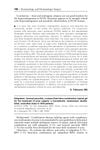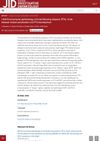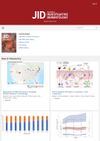
Teprotumumab for thyroid eye disease commonly causes fatigue, brittle nails, dry eyes, hair loss, muscle spasms, and dry mouth, with rare serious events like blood clots.
 2 citations,
January 2004 in “Medical Hypotheses”
2 citations,
January 2004 in “Medical Hypotheses” Hidden fungal infections might cause heart disease and clogged arteries.
37 citations,
August 2019 in “Frontiers in Microbiology” Staphylococcus epidermidis A/C strains are more antibiotic-resistant and infection-adapted, while B strains thrive in hair follicles.
 April 2017 in “The journal of investigative dermatology/Journal of investigative dermatology”
April 2017 in “The journal of investigative dermatology/Journal of investigative dermatology” Most patients experienced mild to moderate skin problems during a trial for a desmoid tumor treatment.
 19 citations,
March 2018 in “Expert Opinion on Drug Safety”
19 citations,
March 2018 in “Expert Opinion on Drug Safety” Most treatments for spondyloarthritis are safe, but monitoring and careful selection based on patient risks are important.
 8 citations,
February 2022 in “Vascular Health and Risk Management”
8 citations,
February 2022 in “Vascular Health and Risk Management” Some skin conditions may increase the risk of heart disease, and understanding their connection could lead to better treatments.
 March 2023 in “JAAD case reports”
March 2023 in “JAAD case reports” A new genetic change in the keratin 10 gene caused a skin condition called ichthyosis hystrix in a father and his daughter.
41 citations,
May 2020 in “Frontiers in immunology” Hidradenitis suppurativa might be a type of autoinflammatory skin disease.
November 2022 in “Journal of Investigative Dermatology” EGFR is crucial for preventing hair follicle inflammation and hair loss.
13 citations,
September 2022 in “Frontiers in immunology” Ifidancitinib, a JAK inhibitor, effectively regrows hair in mice with alopecia by tiring out harmful T cells.
 January 2025 in “Biomedical Reports”
January 2025 in “Biomedical Reports” Telitacicept helped stabilize complement levels in a patient with lupus and thyroid cancer.
 September 2023 in “SKIN The Journal of Cutaneous Medicine”
September 2023 in “SKIN The Journal of Cutaneous Medicine” Talquetamab may cause hair loss and skin issues.
 11 citations,
July 2014 in “Gene”
11 citations,
July 2014 in “Gene” The S250C variant in a gene may cause autoimmunity and immunodeficiency by impairing protein function.
15 citations,
December 2021 in “Pharmaceutics” The study found key factors in the cause of hidradenitis suppurativa, its link to other diseases, and identified existing drugs that could potentially treat it.
 August 2024 in “Clinical Cosmetic and Investigational Dermatology”
August 2024 in “Clinical Cosmetic and Investigational Dermatology” Hypothyroidism may cause certain types of hair loss.
 42 citations,
November 2018 in “Archives of dermatological research”
42 citations,
November 2018 in “Archives of dermatological research” Apremilast was not effective in treating moderate-to-severe alopecia areata.
3 citations,
March 2012 in “Journal of the Egyptian Public Health Association /Journal of the Egyptian Public Health Association” General practitioners in Qassim have satisfactory knowledge of alopecia areata but need more education to address gaps and misconceptions.
 November 2022 in “The journal of investigative dermatology/Journal of investigative dermatology”
November 2022 in “The journal of investigative dermatology/Journal of investigative dermatology” Linalool in personal care products may contribute to hair loss by damaging hair follicle stem cells and triggering harmful immune responses.
194 citations,
October 2018 in “Microbiome” Acne is linked to complex skin microbe interactions, and new findings suggest microbiome-based treatments could be effective.
 January 2011 in “Yearbook of Dermatology and Dermatologic Surgery”
January 2011 in “Yearbook of Dermatology and Dermatologic Surgery” The adapalene-benzoyl peroxide gel works better and faster for acne treatment than using either ingredient alone, with manageable side effects.
 15 citations,
August 2006 in “Journal of Cutaneous Pathology”
15 citations,
August 2006 in “Journal of Cutaneous Pathology” HIV-1 may cause increased stem cell death in hair follicles, leading to hair loss.
May 2020 in “The journal of investigative dermatology/Journal of investigative dermatology” BIVV009 is a safe treatment for bullous pemphigoid that reduces C3 deposition without harmful side effects.
 36 citations,
March 2019 in “European Journal of Human Genetics”
36 citations,
March 2019 in “European Journal of Human Genetics” The research found genetic differences in identical twins that could explain why one twin has a disease while the other does not.
 60 citations,
September 2015 in “Expert Review of Clinical Immunology”
60 citations,
September 2015 in “Expert Review of Clinical Immunology” Lymphocytes, especially CD8+ T cells, play a key role in causing alopecia areata, and targeting them may lead to new treatments.
 42 citations,
March 2006 in “Drug Discovery Today: Therapeutic Strategies”
42 citations,
March 2006 in “Drug Discovery Today: Therapeutic Strategies” The conclusion is that we need more effective hair loss treatments than the current ones, and these could include new drugs, gene and stem cell therapy, hormones, and scalp cooling, but they all need thorough safety testing.
3 citations,
October 2021 in “Indian Journal of Plastic Surgery” Pattern hair loss is mainly caused by genetics and hormones, with limited effective treatments available.
 53 citations,
April 2018 in “Journal of The American Academy of Dermatology”
53 citations,
April 2018 in “Journal of The American Academy of Dermatology” Cancer treatments often cause hair disorders, significantly affecting patients' quality of life, and better management methods are needed.
 April 2023 in “Journal of Investigative Dermatology”
April 2023 in “Journal of Investigative Dermatology” Being allergic to linalool, a common fragrance ingredient, might contribute to developing frontal fibrosing alopecia.
 November 2022 in “Journal of Investigative Dermatology”
November 2022 in “Journal of Investigative Dermatology” Human-induced stem cell-created skin models can help understand skin diseases by studying the skin's layers.
 November 2022 in “Journal of Investigative Dermatology”
November 2022 in “Journal of Investigative Dermatology” Skin aging and cancer development are influenced by the competition between stem cells.




















